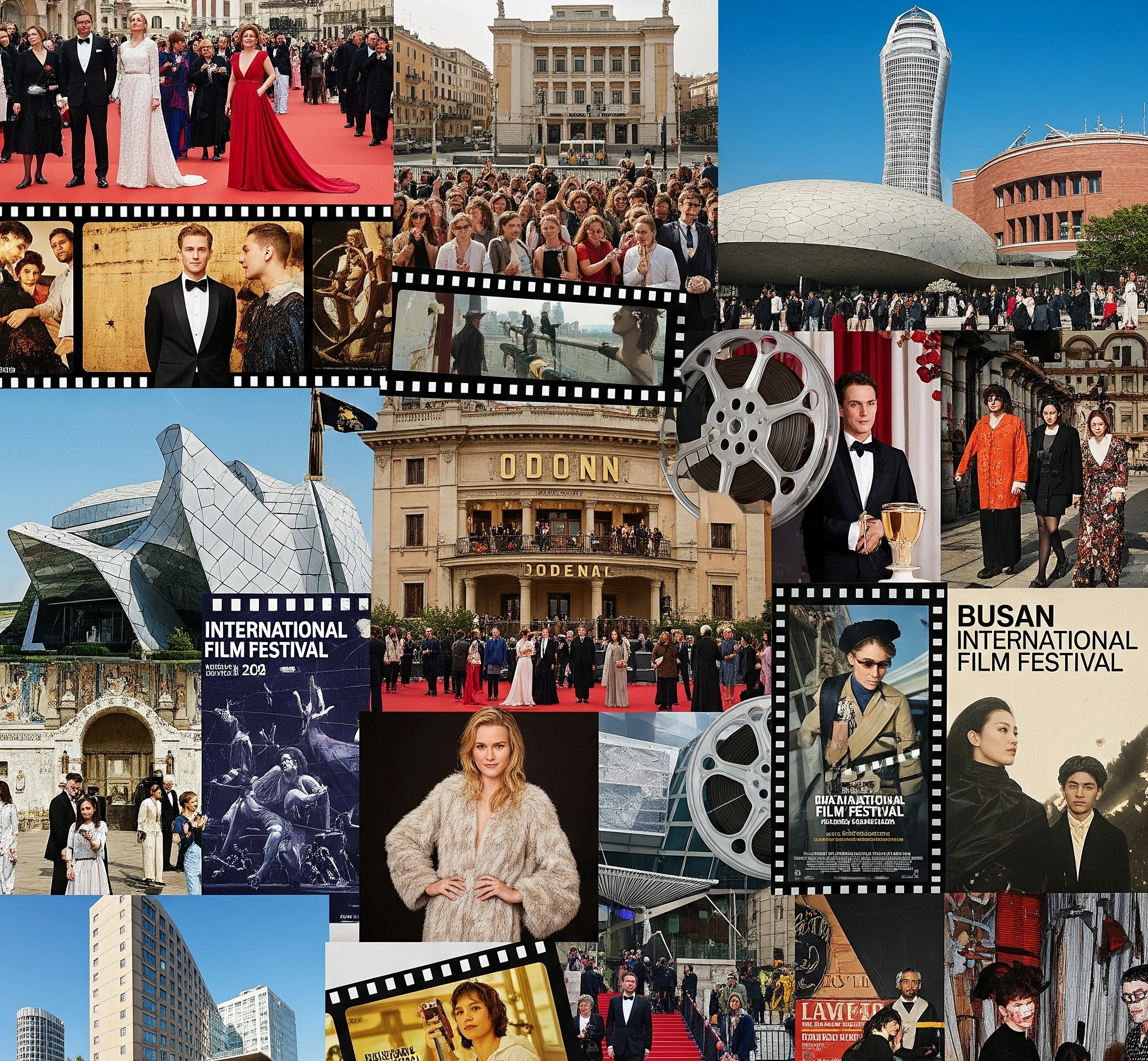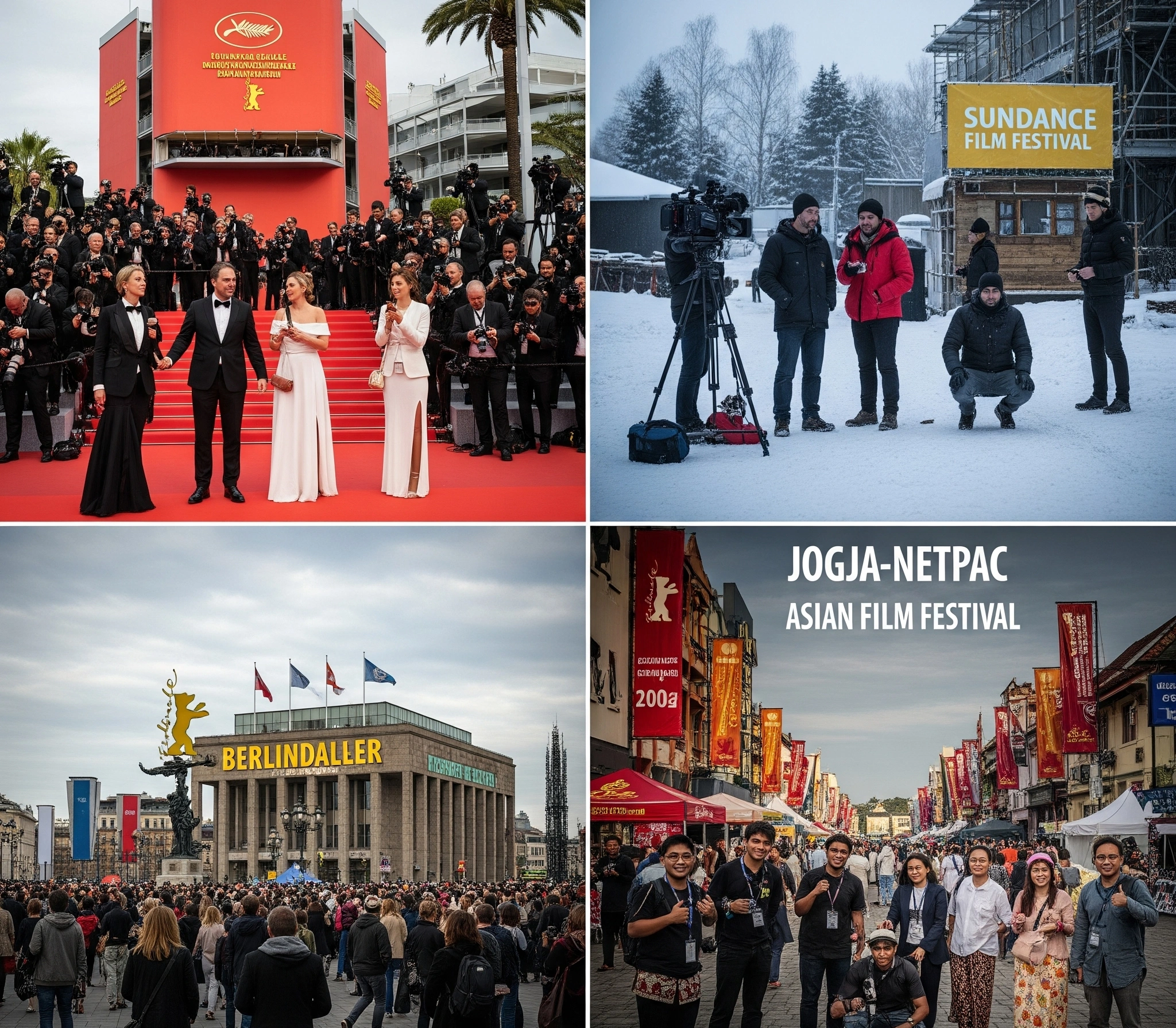Film festivals are more than just glamorous red carpets and award ceremonies; they are vibrant ecosystems where art, commerce, and culture converge. Yet, for many, their inner workings remain a mystifying paradox: are they exclusive playgrounds for the elite, or vital launchpads for cinematic innovation? This article will demystify the intricate world of film festivals, revealing them not as an inscrutable secret society, but as a strategic, multifaceted arena crucial for global cinema’s pulse. We’ll explore their profound impact on filmmakers, audiences, and the very future of storytelling, offering a practical roadmap to understanding their true significance.
Table of Contents
- Unpacking the Roots & Essence: What is a Film Festival?
- Exploring Archetypes: The Diverse Personalities of Film Festivals
- The Filmmaker’s Odyssey: Navigating the Festival Circuit
- Actionable Solutions: Engaging with the Festival Ecosystem
- The Timeless Relevance of Film Festivals in the Digital Age
- The Enduring Wisdom of the Cinematic Gathering
Unpacking the Roots & Essence: What is a Film Festival?
At its core, a film festival is a curated event showcasing films, typically over a defined period. It offers a platform for distribution, networking, and celebrating cinematic art. Furthermore, it serves as a vital bridge between creators and audiences, industry professionals and investors, fostering cultural exchange and artistic discourse. This isn’t about blind faith in celebrity, but a practical roadmap for understanding the strategic role these events play in the global film industry.
Origins and Evolution of Film Festivals
The origins of film festivals trace back to the early 20th century. The Venice Film Festival, founded in 1932, is often cited as the oldest. These gatherings were conceived as cultural events to promote cinema. Over time, they quickly evolved beyond mere screenings. Key figures like Louis Lumière and Georges Méliès laid the groundwork for cinema itself. However, it was the visionaries who understood the power of collective viewing and competitive showcasing that birthed the festival circuit.
Core Components of a Film Festival
Foundational principles include curation, competition, market facilitation, and cultural exchange. They break down into several core components:
- Selection Process: Films are meticulously chosen from thousands of submissions. This process reflects the festival’s artistic vision and programming themes.
- Juries and Awards: Panels of esteemed filmmakers, critics, and industry professionals evaluate films. They bestow awards that can significantly boost a film’s profile and distribution prospects.
- Film Market: Many major festivals host a market where films are bought and sold. This fosters crucial business connections and secures distribution deals.
- Networking Opportunities: Festivals are unparalleled hubs for filmmakers, producers, distributors, and critics. They connect, collaborate, and forge relationships.
- Audience Engagement: Beyond industry, festivals offer unique opportunities for the public. Audiences can discover new films, attend Q&As, and immerse themselves in cinematic culture.
Philosophically, film festivals represent a communal ritual, a modern-day agora where stories are shared and critiqued. They reflect societal values and push artistic boundaries. Their relevance to modern life lies in their ability to champion diverse voices, preserve cinematic heritage, and provide a much-needed physical space for shared cultural experiences in an increasingly fragmented digital world. Ultimately, this is knowledge, not magic; a guide, not a prophecy of box office success, but a framework for understanding the complex interplay of art and industry.
The Diverse Personalities of Film Festivals
Just as characters in a grand narrative, film festivals possess distinct characteristics and serve varying purposes within the global cinematic landscape. Understanding these patterns helps demystify their roles and impact.
Cannes: The Grand Monarch of Glamour and Artistry
- Explanation: The Cannes Film Festival, held annually in France, is arguably the most prestigious and glamorous film festival in the world. It is a dual entity: a high-profile artistic competition for the Palme d’Or and a massive film market (Marché du Film). Its red carpet is legendary, attracting global media attention and A-list celebrities.
- Dualities/Paradoxes: While celebrated for its artistic integrity and championing of auteur cinema, Cannes also faces criticism for its perceived exclusivity and commercialism. It balances the pursuit of pure art with the undeniable demands of the global film market. The paradox lies in its simultaneous role as a beacon of high art and a commercial powerhouse.
Sundance: The Independent Spirit’s Crucible
- Explanation: The Sundance Film Festival, founded by Robert Redford’s Sundance Institute, is the premier showcase for independent cinema in the United States. Held in Park City, Utah, it is renowned for discovering new talent and launching the careers of countless indie filmmakers. It prioritizes original storytelling and diverse perspectives.
- Dualities/Paradoxes: Sundance champions the underdog, often giving voice to films that might not find a home in mainstream Hollywood. However, its success has also led to a degree of commercialization, with major studios and streamers now actively acquiring films there, sometimes challenging its purely independent ethos. It navigates the tension between artistic freedom and commercial viability.
Berlinale: The Politically Conscious Forum
- Explanation: The Berlin International Film Festival (Berlinale) is known for its strong political and social conscience, often featuring films that tackle pressing global issues. Held in Germany, it is a major public festival, drawing large audiences, and also hosts a significant film market (European Film Market) and a talent development program (Berlinale Talents).
- Dualities/Paradoxes: Berlinale’s commitment to social commentary and human rights makes it a unique and important platform. Yet, its emphasis on serious themes can sometimes overshadow purely artistic achievements, leading to a perception of being less “glamorous” than Cannes. It balances artistic merit with social responsibility.
Jogja-NETPAC Asian Film Festival (JAFF): The Regional Pulse
- Explanation: The Jogja-NETPAC Asian Film Festival (JAFF), held in Yogyakarta, Indonesia, is a crucial platform for promoting and celebrating Asian cinema. It focuses on fostering cultural dialogue, nurturing emerging talent from the region, and connecting Asian filmmakers with international audiences and industry professionals. It often highlights films that might not get exposure in larger, Western-centric festivals.
- Dualities/Paradoxes: JAFF represents the vital role of regional festivals in spotlighting diverse narratives and challenging dominant cinematic perspectives. Its strength lies in its local focus and community engagement, but it faces the challenge of securing funding and international recognition compared to its larger counterparts. It embodies the balance between local relevance and global aspiration.
The Filmmaker’s Odyssey: Navigating the Festival Circuit
Consider the journey of Anya, an independent filmmaker from Jakarta, whose debut feature, “Echoes of the Archipelago,” a poignant drama about climate change in coastal Indonesia, has just been completed. Anya dreams of her film reaching a global audience, but the path is fraught with challenges.
Initial Struggles and the Paradox
Initially, Anya felt overwhelmed by the sheer number of festivals. She heard tales of filmmakers spending fortunes on submission fees with no return, or getting lost in the shuffle of massive events. This was her core paradox: how to make her unique story heard in a cacophony of thousands. Her film was deeply personal, culturally specific, yet universally resonant. Consequently, she knew it wouldn’t fit the typical Hollywood mold.
The “Aha!” Moment and Strategic Approach
Her “Aha!” moment came when a mentor advised her to research festivals strategically. This meant understanding their “archetypes.” Instead of blindly submitting to every major festival, she focused on those known for championing independent, socially conscious, and Asian cinema. She tailored her submission materials, emphasizing the film’s environmental message and its cultural authenticity.
Festival Success and Global Reach
“Echoes of the Archipelago” was first accepted into JAFF. The local premiere was a triumph, resonating deeply with Indonesian audiences and critics. The festival’s intimate setting allowed Anya to connect directly with programmers, distributors, and fellow Asian filmmakers. This initial success, furthermore, and the buzz generated at JAFF, caught the attention of a scout for Berlinale.
At Berlinale, the film’s political themes found a receptive international audience. The discussions after screenings were intense and meaningful, and a European distributor expressed strong interest. Meanwhile, while “Echoes” didn’t win a major award at Cannes, its inclusion in a sidebar section (Directors’ Fortnight) provided invaluable exposure, leading to further sales and critical acclaim.
Anya’s journey illustrates how understanding the distinct personalities of film festivals—from JAFF’s nurturing regional focus to Berlinale’s global platform for social cinema, and Cannes’ unparalleled market access—transformed a daunting challenge into a strategic triumph. It wasn’t about luck, but a profound understanding of the festival ecosystem, allowing her to gain awareness, find solutions, and navigate the complex cinematic landscape.
Engaging with the Festival Ecosystem
Understanding the film festival landscape isn’t enough; real transformation and success require concrete action and strategic engagement. These are empowering self-practices, not mystical rituals to control external forces.
1. Strategic Festival Selection
- How to Apply: Research festivals thoroughly. Don’t just look at the biggest names. Consider their focus (e.g., genre, region, theme), submission fees, premiere status requirements, and past programming. Websites like FilmFreeway and Withoutabox offer extensive databases. Prioritize festivals that align with your film’s genre, message, and target audience. For instance, if you have an animation, target animation festivals. If it’s a documentary, look for documentary-focused events.
- Why it Matters: This approach maximizes your chances of acceptance and ensures your film is seen by the right audience and industry professionals. It’s about smart targeting, not shotgun blasting.
2. Crafting a Compelling Submission Package
- How to Apply: Your submission isn’t just the film itself. It includes a concise synopsis, a director’s statement, a press kit, and potentially a trailer. Ensure your synopsis is captivating and highlights the film’s unique selling points. Your director’s statement should articulate your vision and why this film matters.
- Why it Matters: Festival programmers review thousands of submissions. A well-crafted package can make your film stand out and convey its artistic and commercial potential even before they watch it.
3. Networking with Purpose
- How to Apply: Once accepted, attending the festival is crucial. Don’t just watch films. Attend industry events, panels, and mixers. Be prepared to pitch your film concisely and passionately. Exchange business cards, follow up promptly, and build genuine relationships. Utilize festival apps or online platforms to connect with attendees.
- Why it Matters: Festivals are unparalleled networking opportunities. Many deals and collaborations begin with a casual conversation. This is about building a community and finding advocates for your work.
4. Leveraging Festival Success
- How to Apply: If your film gains traction or wins an award, leverage it immediately. Update your press kit, social media, and website with the news. Use laurels on your film’s poster and trailer. Reach out to distributors and sales agents who might have missed your film initially but are now interested due to festival buzz.
- Why it Matters: Festival success creates momentum. This is the time to capitalize on the exposure and turn artistic recognition into distribution deals and further opportunities.
 The Timeless Relevance of Film Festivals in the Digital Age
The Timeless Relevance of Film Festivals in the Digital Age
In an era dominated by streaming platforms and on-demand content, one might question the enduring relevance of physical film festivals. Yet, their importance has only magnified. They are the vital counter-narrative to algorithmic curation, offering a space for discovery, community, and the celebration of cinema as a shared experience.
Film festivals address contemporary challenges such as:
- Information Overload & Algorithmic Filters: While streaming services offer vast libraries, they often push content based on past viewing habits, creating echo chambers. Festivals, with their expert curation, introduce audiences to diverse narratives they might never encounter otherwise, fostering genuine discovery and expanding cinematic palates.
- Independent Cinema Survival: The rise of mega-platforms has made it harder for independent films to gain visibility and distribution. Festivals remain crucial launchpads, providing a platform for these films to find an audience, secure deals, and gain critical recognition, ensuring artistic diversity thrives.
- Cultural Exchange & Dialogue: In an increasingly polarized world, festivals serve as vital forums for cross-cultural understanding. By showcasing films from around the globe, they facilitate dialogue, challenge stereotypes, and promote empathy, bridging divides through shared stories.
- The Human Connection: Despite the convenience of home viewing, the communal experience of watching a film in a darkened theater, followed by Q&As with filmmakers and lively discussions, remains irreplaceable. Festivals foster a sense of community among cinephiles and industry professionals alike.
This understanding provides tangible benefits to the reader’s daily life, whether they are a filmmaker seeking a platform, an industry professional scouting talent, or a cinephile yearning for curated cinematic experiences. It’s about recognizing the strategic, cultural, and communal value that transcends mere entertainment.
The Enduring Wisdom of the Cinematic Gathering
Film festivals, from the grand stages of Cannes to the intimate heartbeats of Jogja-NETPAC, are far more than mere events; they are dynamic, evolving institutions that reflect and shape the global cinematic landscape. They demystify the journey of a film from creation to consumption, revealing it not as a mystical, unpredictable path, but as a strategic ecosystem demanding understanding, engagement, and passion. Their enduring wisdom lies in their ability to champion art, foster community, and bridge cultures, proving that ancestral heritage is not merely a relic, but a compass for life.
As the legendary director Akira Kurosawa once said, “The role of the artist is to not look away.” Film festivals embody this spirit, ensuring that no story, no matter how challenging or unconventional, is overlooked.
Call to Action
Ready to dive deeper into the world of film?
EXPLORE MORE ASIAN CINEMA HERE
DISCOVER INDEPENDENT FILMMAKING RESOURCES
Context and References
Internal Links to Related Articles:
- Read more about the universal principles of Why Superhero Films Never Die
External References:
- (Placeholder for academic papers, reputable encyclopedias like Wikipedia/Britannica, philosophical texts if specific points were cited)
Disclaimer: This content is provided for educational and cultural understanding. Film festival concepts are part of a rich tradition, offering guidance for self-reflection and personal growth, not deterministic prophecies or absolute judgments.

